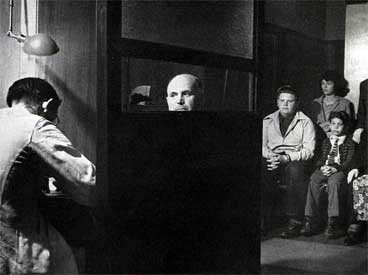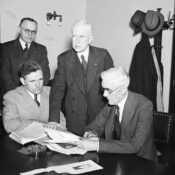There are doubtless occasional instances of this kind under our present system. Usually they can be blamed on the stupidity or callousness of hospital clerks or attendants. But can a compulsory health insurance insure against stupidity, callousness, poor judgment or other human failures? It certainly cannot immediately guarantee a hospital bed for everyone who needs it. In spite of pay rises which have brought more nurses into the hospitals of England, the increased demand for hospitalization has made the shortage more acute since the National Health Service began. There are still 60,000 beds closed by lack of staff. In February the London Emergency Bed Service had 185 calls a day for beds, and each day about 50 persons had to be turned down. The London medical committee, in fact, expressed concern over delay in admitting patients with acute disorders and worried about reports of “many patients who have died, but whose lives might have been saved if energetic action had been taken.” Serious illness was no more prevalent than before the Minister of Health took over the hospitals, but more patients were being referred for admission and had thus crowded the facilities.
And why are there increased referrals to the hospitals? One reason is that the general practitioner is run ragged by people with minor complaints, requests for certificates, prescription refills and permits. When a really sick person turns up, the doctor is so pressed for time that he often follows the simplest course and passes the patient along to the hospital, perhaps without even a tentative diagnosis.
A specialist at London’s famous St. Bartholomew’s Hospital told me, “Many people are coming to our outpatient department who, under the old system, would have and should have been handled by a general practitioner. And often we get only two or three lines from the family doctor on the patient’s referral slip, or just the phrase, ‘Please see.’”
A similar clogging of the medical machinery would almost certainly occur in this country if the Government made medical service freely available to everybody, without any brake on those who might be inclined to abuse or overuse it.
Both Mr. Bevan in England and Mr. Ewing in the United States view the increased demand occasioned by a state medical service as proof of its need. Mr. Ewing has claimed that compulsory health insurance would bring “unrecognized, hidden, or neglected illness out into the open by making medical care more easily available.” But the average doctor in England today has little opportunity to look for the hidden illness or identify the vague symptom. Lord Herder, physician to the King of England and leader of an organized opposition to the health scheme, points out that “the essence of good doctoring is diagnosis, and diagnosis calls for time and a close-up with the patient, both of which are denied to thousands of practitioners here.” He says the doctors’ time has been spread so thin that the standard of medicine in his country is falling.
What about the cost of compulsory health insurance? When Mr. Ewing predicts that the expenditures for this vast program “would represent new burdens on the economy or the contributors only to a limited extent,” he would seem to be either kidding the public or using an unlimited definition of “limited.” Judging by the experience of Britain and other countries, government medicine not only costs far more than private medicine, but also becomes increasingly more expensive as time goes on and the package gets bigger.
The Administration spokesmen for compulsory insurance usually dwell on the wage deduction as its main means of support. This would be a 3 percent tax—divided equally between employee and employer—on wages and salaries up to $4,800, an addition to the present 2 percent Social Security tax for old-age and survivors’ insurance. The self-employed would chip in the full 3 percent. But the Administration bill itself would tap the Treasury for a lot more. It would permit a direct appropriation equivalent to 1 percent of aggregate wages under $4,800 to set up a reserve fund. It would authorize another sum to cover the cost of dental services and home nursing, plus “any further sums required to meet expenditures to carry out this title.” In other words, the funnel is wide open at the top. American Medical Association critics estimate the compulsory-insurance program would cost $10 or $15 billion a year, or two to three times what the country is presently paying for medical care.
Even if we are willing to pay for so grandiose a medical program, it would be impossible, or at least extremely difficult, to provide more medical care with the present number of doctors—about 170,000 active physicians. The Truman-Ewing intention is to allow a three-year “tooling-up” period before putting the scheme into operation, and during this time to start increasing the doctor supply—aiming at a 50 percent gain by 1960—through Federal aid to medical schools and students. In their desire to expand medical education they have support from nearly all groups. But if Government health insurance is in the offing, will it be possible to recruit the high-caliber young men that the profession needs?
In England as well as in America the medical profession has objected to focusing authority in a government officer who may have had no previous experience in medical or health matters. Both the British act and the Murray-Dingell bill set up regional or local boards to deal directly with the doctors, and there is medical representation on these boards. But major decisions are made at the top. In Britain, the Minister of Health, Aneurin Bevan, whose background is labor disputes and not medicine, exerts tremendous power through appointments and the authority to make regulations. He is also the court of final appeal when dismissal of a doctor is sought for “inefficiency” or other reasons—a clause of the act which the physicians fought bitterly but vainly.
Commander in chief of the Government medical system outlined by the new Wagner-Murray-Dingell bill would be the Federal Security Administrator, currently Oscar R. Ewing, a lawyer and the principal Government salesman of the compulsory-insurance idea. The bill sets up a National Health Insurance Board of five members. But it states that all functions of the board “shall be administered by the board under the direction and supervision of the Federal Security Administrator.” The functions include the making of “all regulations and standards specifically authorized” by the bill “and such other regulations not inconsistent with this title as may be necessary.” In other words, the Federal Security Administrator would be the boss, with sweeping powers to regulate and control.
In making regulations, the Federal Security Administrator could consult with a National Advisory Medical Council of 16 members. But the name is somewhat misleading, as only six of the 16 must be “individuals who are outstanding in the medical or other professions concerned with the provision of services.” And all 16 would be appointed by the administrator, an arrangement which could permit the council to become nothing more than a rubber stamp for the Administration’s decisions. Furthermore, the chairman of the main National Health Insurance Board would serve as chairman ex officio of the Advisory Council.
Each state would develop its own plan of operation, to be carried out under a new or an existing state agency, such as a department of health or welfare. The state agency would make agreements with individual medical and dental practitioners, with hospitals or with voluntary-health-insurance groups, to supply medical and hospital service. The state would be divided into local health areas, each with an administrative officer or committee appointed by the state agency. Doctors and dentists in each local area would be given their choice, to be decided by a majority vote, of three methods of payment: (1) a fee for service based on a fee schedule, (2) a per capita basis—an annual sum for each patient on the doctor’s list, as under the English system for general practitioners—or (3) whole or part-time salary. The bill also stipulates that in setting the rates of payment “consideration shall be given to degree of specialization and to the skill, experience, and responsibility involved in rendering the service.” This is, of course, only a statement of aims, and to work out a scheme that would recognize variations in skill and experience would be one of the most difficult tasks of the entire program, as the British have discovered.
This organization chart may look neat and simple on paper. But it is the framework for a huge, sprawling pyramid of administrative officials and committees, mainly nonmedical people, who will number in the thousands. And it is this potential bureaucracy—vulnerable to political pressure and characterized by billions of forms to fill out and file, as under OPA—which the opponents of compulsory health insurance see as a threat to the independence and initiative of the physician and to the quality of medical care.
While one cannot judge the whole British system by the creaks and squawks from scattered sections of it, there are certainly many reports of friction between the doctors and the lay boards, some of whose members are unfamiliar with and even antagonistic toward the physicians’ problems. I was told of a Regional Hospital Board in Yorkshire that, in staffing hospitals, selected as a surgeon a man who had never done any surgery, and which didn’t even have on its lists the name of one of the most experienced men in the community. In fairness to the board, it must be reported that it finally yielded to the organized protests of the doctors of the community and permitted them, in effect, to choose the staffs.
Not all boards have been as reasonable. One lay member, when informed that the doctors’ authority on management matters extended only to making recommendations, replied with some vigor, “That’s fine. Then we can veto them.”
Become a Saturday Evening Post member and enjoy unlimited access. Subscribe now




Comments
Thanks for the article.
Here’s my comment – really just a couple of questions;
I’m wondering if, aside from England where the new system is in it’s infancy, there are any other countries with national health care systems of longer standing. It’s be interesting to me to see how they’ve made out & how they’ve worked out the kinks and what things have yet to be worked out.
And what part do the interests of insurance companies play, everyone knows that money is a big player in the way things are decided in Washington.
That’s it